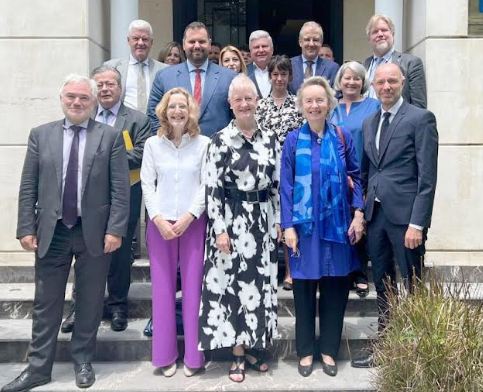Ambassador Kionka of the EU and her Danish counterpart are leaving behind visible legacies. Both envoys were highly active and accessible, often engaging with civil society, media, and government stakeholders. Ambassador Kionka’s Europe Day celebrations became a hallmark of her tenure, consistently drawing large and diverse audiences
ISLAMABAD, JUL 13 /DNA/ – A significant diplomatic reshuffle is underway as five European ambassadors prepare to conclude their tenures in Pakistan. Among them is the German Ambassador Alfred Grannas, whose departure marks the end of an active and engaging chapter in Pakistan-Germany relations. His exit will be followed in August by the ambassadors of the European Union (EU), Denmark, Austria, and the Netherlands, indicating a substantial transition in Pakistan’s diplomatic landscape.
Notably, EU Ambassador Dr. Riina Kionka and Austrian Ambassador Andrea Wicke—both prominent female diplomats—will be succeeded by male envoys, marking a shift in gender representation among key diplomatic postings in Islamabad.
In addition to these changes, ambassadors from Hungary and South Korea, Iraq have already concluded their assignments. Hungarian Ambassador Béla Fazekas, in particular, completed two terms in Pakistan, reflecting his longstanding engagement with the country.
During his tenure, Ambassador Grannas focused on enhancing trade, investment, and development cooperation between Germany and Pakistan. His successor is expected to build upon these foundations and maintain the momentum of bilateral collaboration.
Ambassador Kionka of the EU and her Danish counterpart are leaving behind visible legacies. Both envoys were highly active and accessible, often engaging with civil society, media, and government stakeholders. Ambassador Kionka’s Europe Day celebrations became a hallmark of her tenure, consistently drawing large and diverse audiences. While the scale and nature of these events sparked debate in some quarters, they undeniably generated considerable public interest and goodwill.
Conversely, the ambassadors of Austria and the Netherlands maintained a relatively low profile. Their limited public engagement, even at official levels, led to minimal visibility and modest progress in bilateral ties during their respective terms.
The incoming ambassadors will be tasked with navigating a complex set of priorities—ranging from trade and investment to human rights and regional security—at a time of evolving geopolitical dynamics. Their ability to connect meaningfully with Pakistani stakeholders will be key in determining the future course of relations between Pakistan and their respective countries.

















